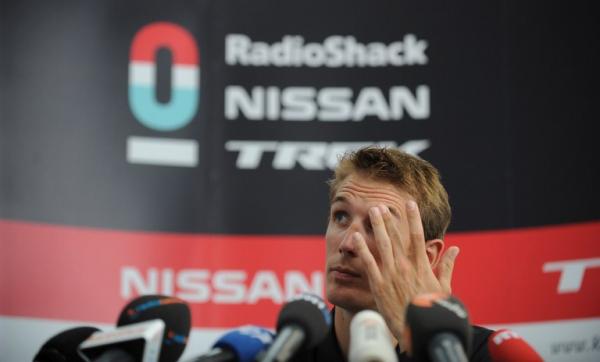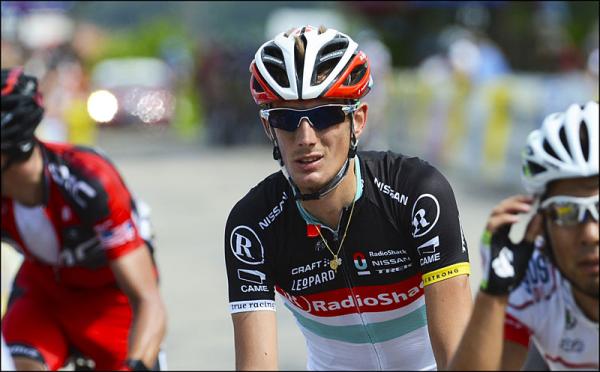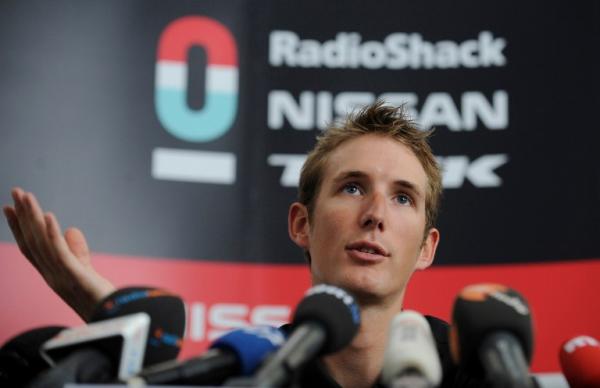Schleck confirms he will miss Tour de France
Dauphiné crash rules out Luxembourg rider



Andy Schleck (RadioShack-Nissan) has announced that he will not ride the 2012 Tour de France after he sustained a fracture to his pelvis in his crash during the Critérium du Dauphiné last week.
In a press conference in Strassen, Luxembourg on Wednesday afternoon, it was confirmed that Schleck had fractured the sacral bone of his pelvis when he fell early on in the stage 4 time trial to Bourg-en-Bresse.
Although Schleck battled through to finish the following day’s stage, he withdrew on the penultimate day of the race. Still in pain on Monday morning, Schleck underwent an x-ray and then an MRI scan, which ultimately revealed the full extent of his injury.
“Yesterday, when I came out of the MRI scan and they told me the news, my world fell apart," Schleck said. "I won't win the 2012 Tour de France, I won't even be in it.”
Flanked by his doctor Charles Delagardelle and orthopaedic surgeon Thorsten Gerich, who said that it would take “between four and six weeks” for the fracture to heal, a solemn Schleck told reporters that he aimed to return to competitive action in time for the London 2012 Olympics on July 28.
Schleck’s absence from the Tour means that he is now on course for a head-to-head battle with his great rival Alberto Contador at the Vuelta a España. Contador returns from suspension shortly before his home Tour, setting up an intriguing clash between the pair in August.
“I hope to be back to ride the Olympics and then my main goal will be the Vuelta a España,” said Schleck. “I’m more motivated than ever before, as people – and journalists in particular – forget very fast.”
Get The Leadout Newsletter
The latest race content, interviews, features, reviews and expert buying guides, direct to your inbox!
Schleck, who has rarely been a factor in major races outside of the Tour and the Ardennes Classics in recent seasons, also said that the world championships in Valkenburg and the Tour of Lombardy could feature on his revised programme. “Since I’m not riding the Tour, I can have many other goals,” he said.
The state of Schleck’s form had been a source of much media attention in recent weeks, and he responded tersely when quizzed on his manager Johan Bruyneel’s thinly-veiled criticism ahead of the Critérium du Dauphiné. “As a pro, you have to deal with critics. If you can’t, you won’t survive in this business long,” he said. “I don’t care.”
Schleck refused to hypothesise how he might have fared in this year’s Tour and called on the eventual winner to be afforded his due respect. “I don’t know if I would have stood in yellow in Paris but that was the goal,” he said. “But whether it’s Wiggins or my brother Fränk or anyone else who wins, I won’t stand there saying, ‘you’re lucky I wasn’t there.’”
Four to six weeks to heal
Orthopaedic surgeon Thorsten Gerich informed journalists on the nature of Schleck’s injury, pulling a plastic model of the pelvic area out from under the desk to illustrate his description as he spoke.
Schleck was referred to Gerich after contacting his personal doctor Charles Delagardelle on Monday morning, citing continuing pain in his pelvic area. While the initial x-ray failed to shed any light on the matter, an MRI scan taken on Monday afternoon revealed the full extent of the damage.
“We couldn’t see anything on the plain x-ray, but that’s not unusual,” Gerich said. “On the MRI imaging we could detect that Andy had a fracture on the sacrum of his pelvis. It’s a fracture which doesn’t compromise the stability of the pelvis, but which really hurts as it is a fracture between two nerve roots.”
Gerich estimated that it would take between 4 and 6 weeks for the fracture to heal, and that Schleck would be unable to ride his bike in that period. “It’s not possible to ride as he would have direct, constant pressure on the fracture,” he said. “He can do other sporting activity as long as it doesn’t affect the pelvis.”
In spite of his disappointment, Schleck looked to sound a defiant note. “I’m out but I can’t drown in self-pity. I have to look forward,” he said.
“What doesn’t kill you can only make you stronger. I believe I’ll come back stronger. I believe I haven’t spoken my last word.”
Click here for a look back at Andy Schleck's 2012 campaign.

Barry Ryan was Head of Features at Cyclingnews. He has covered professional cycling since 2010, reporting from the Tour de France, Giro d’Italia and events from Argentina to Japan. His writing has appeared in The Independent, Procycling and Cycling Plus. He is the author of The Ascent: Sean Kelly, Stephen Roche and the Rise of Irish Cycling’s Golden Generation, published by Gill Books.